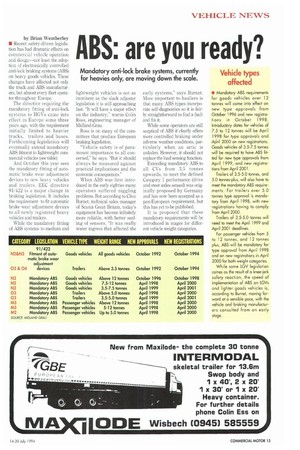ABS: are you ready?
Page 15

If you've noticed an error in this article please click here to report it so we can fix it.
Mandatory anti-lock brake systems, currently for heavies only, are moving down the scale.
by Brian Weatherley
• Recent safety-driven legislation has had dramatic effects on commercial vehicle operation and design—not least the adoption of electronically controlled anti-lock braking systems (ABS) on heavy goods vehicles. These changes have affected not only the tnick and ABS manufacturers, but almost every fleet operator throughout Europe.
The directive requiring the mandatory fitting of anti-lock systems to HGVs came into effect in Europe some three years ago, with the requirement initially limited to heavier trucks, trailers and buses. Forthcoming legislation will eventually extend mandatory ABS fitment to lightweight commercial vehicles (see table) And October this year sees the mandatory fitting of automatic brake wear adjustment devices to new heavy vehicles and trailers. EEC directive 91/422 is a major change in braking legislation. It includes the requirement to fit automatic brake wear adjustment devices to all newly registered heavy vehicles and trailers.
While the mandatory fitting of ABS systems to medium and lightweight vehicles is not as imminent as the slack adjuster legislation it is still approaching fast. "It will have a major effect on the industry," warns Colin Ross, engineering manager of Midland-Grau.
Ross is on many of the committees that produce European braking legislation.
"Vehicle safety is of paramount importance to all concerned," he says. But it should always be measured against practical implications and the economic consequences."
When ABS was first introduced in the early eighties many operators suffered niggling problems. But according to Clive Burnet, technical sales manager of Scania Great Britain, today's equipment has become infinitely more reliable, with better sealing of sensors. "It was really water ingress that affected the early systems," says Burnet. More important to hauliers is that many ABS types incorporate self-diagnostics so it is fairly straightforward to find a fault and fix it While some operators are still sceptical of ABS it clearly offers more controlled braking under adverse weather conditions, particularly when an artic is unladen. However, it should not replace the load sensing function.
Extending mandatory ABS to all CVs from 3.5 tonnes upwards, to meet the defined Category 1 performance (drive and steer axles sensed) was originally proposed by Germany and has now been accepted as a pan-European requirement, but this has yet to be published.
It is proposed that these mandatory requirements will be introduced in stages for different vehicle weight categories.




























































































